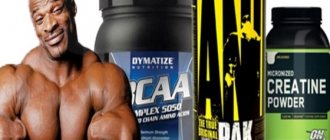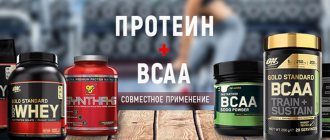Protein is the scientific name for protein, an organic substance consisting of amino acids. Proteins are the basis of the life of any organism. They ensure cell growth and division and are involved in all metabolic processes.
The importance of protein for the human body
In the human body, proteins perform the following functions:
- muscle building;
- synthesis of enzymes and hormones;
- bone formation;
- maintaining immunity;
- ensuring the functioning of the nervous system.
Protein for weight loss
When entering the digestive system, under the action of enzymes, protein is broken down into amino acids. From these, the body synthesizes its own, new proteins. The components of protein - amino acids - are replaceable, that is, synthesized in the body, and irreplaceable, which are not synthesized in the body. The latter must be supplied with food. There are only eight of them, but three essential amino acids are needed for muscle growth and fat burning: leucine, isoleucine and valine. They are combined into the BCAA complex due to the similarity of their spatial structure.
It is vital for a person to consume enough protein in food. Meat, fish, eggs, dairy products, nuts, legumes and cereals are rich in proteins.
For athletes or people experiencing increased physical activity, more protein is required to maintain normal body condition. If it is insufficiently supplied with food, lethargy, fatigue, apathy are observed, the immune system suffers, and the condition of the skin, muscles, hair and nails worsens. To compensate for protein deficiency, it is recommended to take dietary protein supplements. They do not contain any dangerous “chemistry” or steroid hormones. This is a sports nutrition consisting of protein that has gone through various stages of purification.
Why do you need to take proteins?
Athletes take proteins to build muscle. Protein supplied from food is the material for building muscle fibers and allows existing muscles to “ not burn ” during intense training.
The fact is that during physical activity and lack of nutrition, the body first gets rid of cells that consume more energy, so muscle cells are destroyed faster under the influence of catabolism than fat cells.
Should I take protein and why is it needed? The benefits and harms of protein
What does protein provide and what is it for?
Protein is the most popular type of sports nutrition today, which is a dry protein - usually milk, egg or vegetable, consisting in turn of many amino acids (20, to be precise), involved in all vital processes of our body. What are the benefits and harms of protein? When answering the question whether it is worth drinking protein and how it is useful, first of all we need to say that all our cells are made of protein and almost everything in our body needs protein - muscles, ligaments, skin, hair, nails, blood vessels, bones, nervous and immune systems, hormones, enzymes, etc. are built from protein. Add here such important properties as building muscle mass, satisfying hunger and suppressing appetite, as well as increasing strength, endurance and performance.
Is protein harmful?
Protein is the same protein that we eat every day - eggs, cottage cheese, meat, nuts, legumes - all these are protein-rich foods. But protein is specially prepared, sometimes fermented, dried and packaged in bags or jars of protein, without excess fats and carbohydrates. Based on the results of many studies, experts have concluded that taking protein does not cause negative consequences if all the rules for using the product are followed and the recommended daily allowances are not violated. In rare cases, allergic reactions and individual intolerance may occur, that is, everything that can be caused by any food product.
Why do you need to drink protein?
Of course, protein is primarily necessary for people who lead an active lifestyle and adhere to a specific nutrition plan in order to control weight, lose weight, gain weight, increase endurance and strength. As we said above, protein helps accelerate the growth of muscle mass - because protein is the main material for building muscles, and also to lose weight - by consuming protein, it is much easier to control your appetite and not indulge in high-calorie junk foods, and also improve your appearance (all in the body consists of protein - skin, nails, hair - too) and the overall result of playing sports.
Do people who don't exercise need protein?
Should you consume protein if you are not doing intense physical activity? The answer is “yes” if you have an unbalanced diet and do not eat enough protein foods. The average moderately active person needs 1.5 grams of protein per 1 kg of weight per day. That is, if you weigh 60 kg, then your body needs to consume 90 grams of protein. Do you get this amount of protein from regular foods? If yes, then you do not need protein supplements; if not, then either increase the amount of protein-containing foods in your diet, or include protein or amino acid complexes in your diet. Protein shakes are often used as a protein snack to “complement” the required protein intake.
Why do I need protein if I eat 10 scrambled eggs for breakfast and pork knuckle for dinner - you ask?
With such a diet, you are probably doing well with protein, as well as with the amount of fat. With such a diet, excess weight gain, problems with blood vessels, digestion, and other delights of eating fatty and high-calorie protein foods are not far off. The big advantage of ready-made protein mixtures is that they are practically devoid of fats and carbohydrates, and by consuming protein in the form of a cocktail, it is much easier to adhere to your protein intake and “cut off” excess fats and carbohydrates that the body does not need.
Side effects
It is believed that excessive protein consumption can lead to kidney and liver diseases. Uric acid accumulates, which causes urolithiasis.
There is no reliable evidence to support this. However, if the dosage is overestimated or low-quality products are used, adverse reactions may occur. That is why it is recommended to buy protein made only by trusted manufacturers.
Protein shakes, like any other food, can cause allergies. This may be a banal intolerance to one of the components included in the composition. To reduce the cost of production and improve taste, components that can negatively affect the body are added to protein mixtures:
- Taurine is an amino acid, when consumed in excess, the heart and blood vessels begin to work harder. The component also affects the nervous system.
- Thickeners – when consumed regularly, contribute to the formation of ulcers and other diseases of the gastrointestinal tract.
- Dextrose and maltodextrin - these synthetic sugars increase the likelihood of obesity, diabetes, and disrupt metabolism.
- Cyclamate, aspartic acid, aspartame are sweeteners, are not completely absorbed, and are contraindicated for kidney and vascular diseases.
In addition, if you consume too much protein, you may experience digestive upset, which usually goes away within 2-3 days.
What is protein made from and what types does it come in? Types of protein and content in products
How to choose quality protein? First, you need to know what products contain protein (to understand what protein is made from), and also understand what types of protein are currently on the market and what their differences are.
For your convenience, we have collected the main types of proteins from best to worst, as fundamental factors, choosing the amino acid profile, time and degree of absorption, taste and biological value.
Why is the amino acid profile important and what is it?
The answer is quite simple: if you consume protein in which the composition of amino acids is not balanced, then the negative consequences will be a disruption of protein synthesis in your body. Protein metabolism is disrupted and, as a result, the processes of breakdown begin to prevail over the processes of creation. This affects not only muscles, but also general metabolic processes.
It is extremely important that the protein not only contains all the necessary amino acids, but also maintains a certain ratio of amino acids. What is the biological value of protein?
The biological value of protein is an indicator that reflects how well protein is processed in our body, how it is absorbed and further utilized. If the composition of the protein is close to the proteins in our body, then its amino acid profile is well balanced and perfectly absorbed. Thus, high-quality proteins contain at least 30% essential amino acids. This category includes animal proteins: meat, dairy products, eggs, fish. Proteins with lower biological value are legumes, cereals, buckwheat, and nuts. Ideally, combine proteins with high and low biological value to obtain a balanced amino acid composition.
| TYPE OF PROTEIN | AMINO ACID PROFILE | LISTENING TIME | TASTE | ADVANTAGES | % ABILITATION | BIOLOGICAL VALUE |
| Whey : isolate | balanced, all amino acids present | 1.5-2 hours | nice | quickly absorbed, mixes well with other components, balanced amino acid profile | 95% | 100 |
| concentrate | 1.5-2 hours | nice | ||||
| hydrolyzate | 10 minutes-1 hour | bitter | ||||
| Egg | balanced, considered the most suitable for the human body | 3-4 hours | Specific, “egg” | high bioavailability, good amino acid profile, suitable for those intolerant to milk protein or lactose | 97% | 100 |
| Casein micellar calcium caseinate sodium caseinate | balanced | up to 6-8 hours | Thick, specific | The amino acid profile is good, indispensable during the “drying” period, as well as for weight loss, long, but well absorbed | 80% | 80-90 |
| Vegetable: pea | balanced | is slowly absorbed | Specific, “pea” | suitable for vegetarians, easy to digest | 80% | 65 |
| soy | defective | is slowly absorbed | neutral | 60-80% | 74 | |
| hemp | balanced | average absorption rate | Specific, “herbal” | 75% | 70 | |
| Beef | balanced | 2-3 hours | unpleasant taste characteristics | Good amino acid profile, suitable for those who are lactose intolerant | 95% | 75 |
In addition to the types of protein listed in the table, which are the most common, it should be said about some other existing types that have become increasingly common on the protein products market:
- wheat
- rice
- from pumpkin seeds
- brown rice
- from sunflower seeds
- from chia seeds
- peanut
- fish
Plant protein has gained popularity among vegetarians, as well as those who are intolerant to lactose and animal protein.
What (which foods) contain protein, that is, protein? We collected all the necessary information in a table:
| THE PRODUCT'S NAME | CONTENT PER 100 GRAMS (G) |
| Soybeans | 35 |
| Chicken breast | 29 |
| Beef meat | 28 |
| Mutton | 25 |
| Lentils | 25 |
| Cashew | 25 |
| Pumpkin seeds | 25 |
| Turkey | 23 |
| Tuna | 23 |
| Sunflower seeds | 23 |
| Cheese | 23 |
| Shrimps | 23 |
| red fish | 22 |
| Beans | 22 |
| Peas | 21 |
| Cod | 21 |
| Mash | 21 |
| Veal | 19 |
| Almond | 19 |
| Beef liver | 18 |
| Cottage cheese | 18 |
| Hazelnut | 16 |
| Brazilian nut | 14 |
| Walnut | 14 |
| Quinoa | 14 |
| Buckwheat | 13 |
| Eggs | 13 |
| Cocoa | 12 |
| Oat groats | 12 |
| Millet | 12 |
| Tofu | 10 |
| Greek yogurt | 10 |
| Milk | 5 |
Milkshake with biscuit flavor
A drink with an original cupcake flavor is suitable as an addition to a light breakfast. And it doesn’t take long to prepare.
Features : original biscuit taste, only 140 calories per serving, low fat content, high in protein, gluten free.
| Ingredients | Quantity |
| Low-fat kefir | 2 glasses |
| crushed ice | 2 glasses |
| Cereals | ½ cup |
| Vanilla paste | 1 teaspoon |
| Butter | 1 teaspoon |
| Liquid stevia extract | ½ teaspoon |
| Almond extract | ½ teaspoon |
| Multi-colored confectionery sprinkles | 2 teaspoons |
- Volume: 3 servings
- Calories: 140 kcal/serving
- Will be ready: in 10 minutes
- Difficulty: easy
Cooking:
- Place all ingredients in a blender bowl and blend until smooth.
- Let the drink brew for a couple of minutes, taste and add a little sugar and ice.
- Serve with natural whipped cream, confetti and straws.
Advice! For the base of the drink, you can use 1 cup plain nonfat Greek yogurt + ¾ cup unsweetened almond milk.
Which protein should you choose? Which one is better for gaining weight and which one is better for losing weight?
Which protein is best to choose for gaining muscle mass?
or for weight loss? It is very important for us that you understand that there is no separate protein for muscle growth and a separate protein for weight loss - in essence, all proteins are universal. At the same time, depending on the goal, we can recommend those types of proteins that, according to their characteristics, will be of higher priority.
If we are talking about what kind of protein to take to gain weight, the most popular are whey and egg, as they have a balanced amino acid profile and good digestibility. That is, with them you will achieve your goal many times faster and more efficiently.
What protein is best to drink for weight loss?
In this case, both complex multiproteins and whey protein are suitable, however, first of all, you should choose casein, which, due to its slow absorption, suppresses the feeling of hunger for a long time. As a result, the number of calories consumed is reduced, appetite is dulled, weight loss occurs, and, importantly, not due to muscle loss, but due to the loss of the fatty component of our body.
Best Whey Protein 2022
For your convenience, we list a number of the most popular and effective supplements. All of them are great for gaining mass, including by professional athletes. If you see WHEY on a can of protein, it means it’s whey. In this case, WPC is a concentrate, WPI is an isolate, WPH is a hydrolyzate.
- WEIDER GOLD WHEY PROTEIN
For every 100 g there are 24 g of protein and 23 g of amino acids. Low sugar and fat content. Available in a wide variety of delicious flavours. Dissolves well. - SAN 100% PURE TITANIUM WHEY
Great taste and premium quality have made this supplement one of the most popular in the world. Guarantees effective dry mass gain. Contains additional elements to prevent catabolism and active muscle formation. - DYMATIZE ELITE WHEY PROTEIN
A good mixture at a reasonable price. Provides the protein concentration necessary for the growth and preservation of muscle tissue. - ULTIMATE NUTRITION PROSTAR WHEY
Suitable for both hard-training athletes and ordinary people who train 1-2 times a week. It is best taken after training, its duration does not matter. Allows you not only to restore and ensure muscle growth, but also strengthen the immune system. - OPTIMUM NUTRITION 100% WHEY GOLD STANDARD
It is a mixture of isolate, concentrate, and whey peptides. The content of fats and carbohydrates is kept to a minimum. Very popular due to its high efficiency and large selection of flavors.
Consultants from a specialized store can also help you with your choice. But that’s not all, now you need to figure out how the supplement should be taken.
Which protein to choose for women and which for men?
Which protein is better for women and which is better for men?
There are no individual proteins that differ by gender. Therefore, answering the question of which protein would be better for girls, then, as for men, the best would be whey, milk (casein) or egg protein, since these types of protein are more balanced in amino acid profile, digestibility and biological value. But such a division - into men and women - occurs when we are faced with restrictions for one reason or another. For example, we often encounter taboos on dairy products and lactose among a predominantly female audience - cosmetologists and nutritionists are increasingly limiting the consumption of dairy products due to allergies, intolerances and negative effects on the condition of the skin and the digestive process. If we are talking, for example, about plant proteins, in particular about soy protein, then in its composition you can find phytoestrogens - substances similar to the female hormones estrogens. Thus, we do not recommend this type of protein to the male half of humanity.
So, for women who limit their consumption of dairy products, as well as vegetarians, we recommend plant protein - ideally a mixture of pea and hemp. This mixture has a balanced amino acid profile, rich in arginine and glutamine. If a woman has no problems digesting dairy products or animal protein, then whey, egg or casein protein is suitable.
For men with intolerance to dairy products, egg or animal protein, such as beef, can be recommended. If you are on a vegetarian diet, fasting, or have an intolerance to animal protein, it is also better to use plant mixtures rather than pure types of plant protein.
In addition, the division into female and male proteins takes place if the product is additionally enriched with predominantly “female” or “male” vitamins or, for example, fiber. Often on the market you can find protein shakes for women, enriched with prebiotics for digestion, or certain vitamins, the intake of which is especially important for women's health.
General information
This supplement is made from regular cow's milk and has an 80/20 protein ratio of casein and protein.
Whey is a by-product of milk processing. It has a yellowish transparent color and a sour, pungent taste. In its pure form, this product is used in cooking; when fermented, it is consumed as a drink. It consists of protein and lactose.
It is from this product that whey protein is then created. All excess moisture is evaporated at very high temperatures, leaving a pure natural protein product rich in amino acids and microelements. This type of protein is best absorbed by the human body.
How to take protein for weight gain and weight loss
How to take protein to get results? Remember: protein is protein, so you need to consume it taking into account your overall diet containing protein foods, not forgetting the recommended dosages.
How to properly consume protein? You can take up to 3 servings of protein per day, that is, 60-70 grams of the product. It is advisable to get the rest from regular products.
When is the best time and how to drink protein to gain weight? The diagram looks like this:
- an hour before training
- within an hour after training
- as a snack between main meals
You should also add intense sports, mainly strength training, and create a calorie surplus in your diet.
How to drink protein for weight loss? The scheme is as follows:
- you can drink protein at night an hour before bed
- also within an hour after training and an hour before it
- replace one of your meals
- as a snack if you feel hungry
How to properly dilute protein? Boiling water should not be used to avoid protein denaturation. Otherwise, to prepare a protein shake, you can use water, juices, milk, preferably at room temperature. But for weight loss, it is better to dilute the protein in water or skim milk, taking into account the total calorie content of the drink.
Which one to prefer?
Beginners are advised to give preference to complex protein. For experienced athletes, single-component proteins - whey or egg - are more suitable. Casein can also be used, but it should only be consumed at night, since this product is absorbed by the body within 7-8 hours.
Whey protein is suitable for those who want to lose weight, for those who are working to increase muscle mass. Used before and after training. It is preferable to choose isolate. How much protein is in a serving of whey protein isolate? The content reaches 90-95%. It is quickly absorbed and saturates muscle tissue with high-quality amino acids.
The best option would be if you find out from your coach or sports doctor what kind of protein you need specifically.
How much protein should you drink per day and duration of intake?
How many grams of protein can and should you drink per day? As we said above, the amount of protein that can be taken daily is up to 3 servings per day, depending on your diet, because we get the rest of the protein from food. Let us remember that one serving is usually 30-40 grams of product, which usually contains from 18 to 24 grams of protein. The higher the protein content in the product, the better.
It is necessary to monitor the amount of calories consumed as well as protein in order to calculate the missing amount of protein.
How much protein can you drink:
- with intense loads - 2-2.5 grams per kilogram of weight
- with moderate training or no sports activity - 1.5 grams per kilogram of weight
Based on this formula and knowing your diet, you can independently calculate the portion of protein needed for you personally.
Carbohydrates
Protein shakes made with water contain an average of 1-2 grams of carbohydrates. As mentioned above, this is ideal for a low-carb diet. Cooking with any milk will result in an additional 12-13 g of carbohydrates. When reducing fat mass, every gram of carbohydrates is on a pencil, and just drinking an extra 13 g is simply an unaffordable luxury. That's about 4 teaspoons of sugar! And if three times a day, then this is already 40 g of sugar only with milk. If protein is consumed at the stage of weight gain, then carbohydrates will not be a hindrance; you can do it with milk, but be careful of the fat content.
Protein during pregnancy and breastfeeding - is it possible or not?
Is it possible to drink protein during pregnancy and breastfeeding? Yes, you can. At the same time, there is often an opinion that use is not recommended for women during pregnancy, as well as during lactation. Why? Because sports nutrition manufacturers do not conduct extensive research into the effects of protein on pregnant women, because they are simply not the main target group of the final product.
Protein is a protein, and it is a safe product, the only thing we recommend is:
- choose proteins with a minimum amount of flavoring additives to avoid possible allergic reactions
- introduce protein into your diet gradually so that your body gets used to the product and you can evaluate its effect on your body, avoid gastrointestinal upset, individual intolerance and other possible side effects on the body.
American milkshake S'mores
Low-calorie drink, with the taste of a popular dessert in the USA. The cocktail will require considerable time to prepare, so it is best suited as a treat on weekends or holidays.
Features: aromatic, nutritious, quickly digestible drink. Calorie content – 160 kcal.
| Ingredient | Quantity |
| Whole cow's milk | 1.5 cups |
| Marshmallow crumbs | 3 tbsp. spoons |
| Crackers | 70-80 g |
| Cocoa powder | 1 teaspoon |
| Agave syrup | ¾ teaspoon |
| Chocolate chips | 15-20 g |
- Volume : 2 servings
- Calories: 160 kcal/serving
- Cooking time : more than 1 hour
- Difficulty: takes time
Cooking step by step:
- Pour one cup of milk into an ice cube tray and place in the freezer.
- When the milk cubes are ready to eat, preheat the oven. Place marshmallow crumbs on a greased baking sheet. Warm up for 1-2 minutes and remove.
- Place milk cubes, remaining milk, crackers, cocoa powder and agave in a blender bowl. Beat until smooth.
- If the drink turns out too thick, you need to add more milk.
Vegetable smoothies: 11 homemade recipes
Vegetable smoothie is a healthy vitamin drink that is consumed primarily for weight loss and cleansing the body. Many recipes for its preparation allow you to diversify your daily diet.
Green smoothies for proper nutrition: 10 simple recipes
A smoothie is a mixture of greens, fresh vegetables and fruits, as well as berries. They replace breakfast, snack or dinner. There are green, dairy, fruit and vegetable options. Here we share green smoothie recipes.
see also
Detox smoothie to cleanse the body, and at the same time lose weight!
Can children eat protein?
Can children eat protein? The situation here is the same as with pregnant women: there have been no large-scale studies or tests of the benefits or harm of protein in children. For our part, we can say that children can be given small amounts of protein in the form of snacks or bars, and also added to dairy products to replenish the amount of protein the child needs. Moreover, every parent knows how difficult it is to get a child to get protein from food through meat, fish and other protein-containing foods.
At what age can a child drink protein? From birth, protein is included in the baby's diet. If we are talking about protein powder in the form of supplements or protein snacks, we recommend including them in the diet in small portions no earlier than when the child reaches 3-4 years of age. A child’s protein requirement changes with age and looks like this:
- 3-7 years, no more than 3-3.5 grams of protein per kg of body weight, while the child can receive 1/3 of the protein from protein supplements
- 8-14 years old, no more than 2.5-3 grams per kg of body weight, a child can receive 1/3 of protein from protein supplements
- from 14 years old, 1.5-2 grams per kg of body weight, a child can receive 1/3 of protein from protein supplements
Accordingly, you can replace 1/3 of this protein with protein, focusing on the weight and age of the child.
BENEFITS OF PROTEIN SUPPLEMENTS
As we said, protein supplements keep you full for a long time. They help control the amount you eat due to the fact that protein is absorbed more slowly than carbohydrates. The advantages of protein shakes include the following:
- they are low-calorie: to lose weight, you can replace unhealthy snacks with protein;
- protein supplements are suitable for vegetarians and vegans who find it more difficult to reach their daily protein intake;
- protein is easily digestible and normalizes insulin levels in the blood - the latter is especially important for diabetics.
Protein cookies are suitable for snacking at school or work, and protein powder can be added to milk or kefir. You shouldn’t get carried away with them either: protein supplements have a positive effect on metabolism, but if you replace all snacks with them, you can get the opposite effect. It’s better to make, for example, a banana smoothie with milk and peanut butter.
Another snack option is a soy milk-based smoothie with your favorite berries or fruits.
It should be borne in mind that the composition of one protein bar is sometimes significantly different from the composition of another. You can take a carbohydrate-protein bar or a high-protein bar, but if you have set a goal to lose weight, the amount of carbohydrates in a 100-gram bar should not exceed 15 grams. A small amount of fat in the composition will also not harm: together with dietary fiber and carbohydrates, fats will soften the load on the body that protein provides.
Is it possible to drink protein without training?
Can you drink protein if you don't exercise? Drinking protein without training is okay if your diet doesn't contain enough protein. In this case, we focus on the protein dosages recommended in the absence of physical activity - 1.5 g per 1 kg of weight.
What negative consequences can arise from protein deficiency in the body? are possible :
- fragility, brittleness of nails
- muscle weakness
- lack of muscle mass
- hair loss, dry hair
- overeating, sugar cravings
- swelling
- weak immunity
- migraines, headaches
- insomnia
- mood swings
In order to prevent the occurrence of such symptoms, you should carefully monitor the amount and quality of protein consumed in your diet.
Protein milkshake with greens
Many people like the taste of greens, especially the aroma of spinach. Now you can use this product to make a healthy low-calorie milkshake.
Features: original refreshing taste. The calorie content of a serving is no more than 180 kcal.
| Ingredient | Quantity |
| Cow's or unsweetened almond milk | 1 glass |
| Peeled spinach leaves | 20-25 leaves |
| A pineapple | 3-4 slices |
| Banana | 1 PC |
| Chia seeds | 1 tbsp. spoon |
| Flaxseed flour | 1 tbsp. spoon |
| Ice cubes | 3-4 pieces |
- Volume : 1 serving
- Calories: 180 kcal/serving
- Will be ready : in 10-15 minutes
- Difficulty: not difficult
Cooking:
- Place all ingredients (except ice) in a blender and blend until the mixture is smooth.
- Then add a few ice cubes and beat again for a while.
Which is better: protein or gainer?
Gainer or protein: which is better for gaining muscle mass? To answer this question, you should remember what body types exist:
- ectomorphs: very slender, rather lean people, with a low level of subcutaneous fat, long, thin arms and legs. This type of person has a high metabolism and endurance.
- mesomorphs: characterized by an average level of subcutaneous fat and metabolism, easily tolerate serious sports loads
- endomorphs: people who are heavily built, stocky, have a low metabolic rate, and also tend to gain weight
Based on this, when choosing between a gainer and a protein, you should be guided by the fact that protein for weight gain is recommended for those who gain weight well in principle, that is, endomorphs and mesomorphs. A gainer should be chosen by those who have difficulty gaining weight, that is, ectomorphs.
Read more about what a gainer is and which one is better to choose here.
Recommended by topic
Milkshakes without ice cream - 10 recipes for every taste Recipes for milkshakes with oatmeal Detox smoothies to cleanse the body, and at the same time lose weight!
Cooking:
- Add all ingredients to a blender and blend until smooth.
- Taste and adjust sweetness level if necessary.
Adviсe.
- You can replace the cocoa with vegan chocolate powder.
- There are two options for preparation: if you use unsweetened milk, you will need to add more maple syrup. Otherwise, the amount of sweetener should be reduced.
- Soy, cashew, and almond milk are suitable as plant milk.
- If you use frozen bananas, the cocktail will have a thicker, creamier consistency, reminiscent of kefir. For an even thicker milk drink, you can use up to 2 bananas if desired.
Number of calories in your cocktail
How many calories your shake should contain depends on your goals. If you train a lot and aim to gain muscle mass, then you need at least 20 grams of protein and several hundred calories .
If you're trying to lose weight, on the other hand, you can limit calories and use your shake as a regular meal replacement. How many calories should such a cocktail contain? In this case, nutritionist Emily Rubin recommends keeping the shake to less than 200 calories.
What is a balanced diet
According to the theory of a balanced diet, adopted back in the 19th century, the energy intake in calories received from food should be equal to the expenditure.
Energy costs vary and depend on gender, age, type of work, physical activity, physiological and genetic characteristics of a person, as well as on the environment. In women, energy expenditure is approximately 10% lower than in men, and in older people it decreases by 7% every ten years.
For the normal functioning of the body, it is necessary not only to supply it with the optimal amount of energy and nutrients, but also to maintain certain ratios of proteins, fats, carbohydrates, vitamins, and minerals supplied with food.
Protein shake with strawberry cheesecake
This strawberry cheesecake flavored protein shake is one of those treats that both adults and kids will love. An important plus is that the drink is very quick and easy to prepare.
Features: tasty and original delicacy, quickly prepared. Nutritional value per serving: 206 calories.
| Ingredient | Quantity |
| Low-fat yogurt | ⅓ glass |
| Unsweetened almond milk | 1 glass |
| Frozen strawberries | 1.5 cups |
| Frozen sliced banana | ½ cup |
| Vanilla Protein Powder | ¼ cup |
- Volume : 2 servings
- Calories: 206 kcal/serving
- Ready in : 3-5 minutes
- Difficulty: easy
Curd cocktail with blackberries
Cottage cheese is a valuable source of affordable and easily digestible protein, as well as many other nutrients and beneficial substances, especially calcium. Protein is essential for maintaining muscle mass during intense training when following a low-calorie diet.
Features: refreshing pleasant taste, high concentration of calcium, magnesium, vitamins. Nutritional value of 1 glass of drink – 158 calories.
| Ingredient | Quantity |
| Cottage cheese | ½ cup |
| Cow's milk | ¼ cup |
| Frozen banana | ½ fruit |
| Frozen blackberries | ½ cup |
| Fresh spinach | small bunch |
| Cinnamon | ¼ teaspoon |
| Vanilla extract | on the tip of a knife |
- Volume : 1 serving
- Calories: 158 kcal/serving
- Will be ready : in 5-8 minutes
- Difficulty: easy











